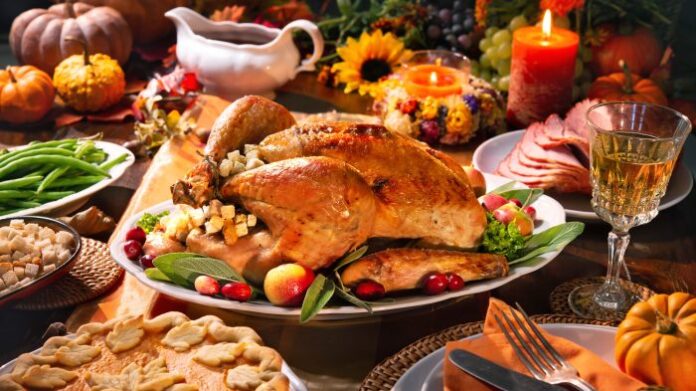Is Black Southern cuisine — often reduced to the simple term “soul food” — unhealthy or “low-vibration“? Or is it not high blood pressure that runs in your family, but the “plate,” as actress and vegan food influencer Tabitha Brown reportedly said recently? It’s a tired debate, but it is necessary since ignorance runs deep.
But Black food is not killing Black people.
Black Southern food is seasonal, healthy, nuanced, and rich with culture and meaning. Systemic racism — in the form of food deserts, stress induced by racial terror, and medical negligence — kills us, not the food made by our people’s experienced and loving hands. The idea that Black food is unhealthy and inferior is rooted in anti-Blackness and prejudice against overweight people. And to understand our food and to fight back against these narratives, we must realize our migrant roots are the key.
The Great Migration — when millions of Black people came to the North from the South, fleeing economic oppression, Jim Crow apartheid, and the ever-present threat of lynching — was one of the most significant movements of people in U.S. history. Our families tried to hold onto the South, sending us to Alabama and Mississippi for summers, but as with any migrant community, over generations, those connections faded. And with those faded connections came a hazy idea of Black Southern food.
People distanced from their Southern roots are determined to reduce Black Southern food as unhealthy “slave food.” But this isn’t the experience of actual Southerners or people who have maintained those connections and knowledge.
Chef Amethyst Ganaway, who grew up in South Carolina, said, “Our proximity to fresh food is what fed us and kept us alive before and after being brought here — not the scraps of white people and not through overly processed foods either. Even as a poor Southerner, I never grew up eating fast food or ‘junk.’ We had pecan and pear trees. We had fishermen and hunters in our families and communities. People with these weird takes on soul, and Southern food are disconnected from their roots. That’s why it’s so easy to spread misinformation and feed into stereotypes.”
That’s why Ganaway said it’s vital to talk to your elders and learn. “There’s been some disconnect between elders and the younger generations. I’m probably one of the only millennials in my family and the last generation to have snapped peas with my elders.”

Nylah Burton
Cora Harrington, who grew up in Georgia and whose family is from rural Mississippi going back generations, points out that people who insist Black or soul food is unhealthy are “often folks whose grandmas and great-grandmas were the last people to live in the South. Their connection to Black Southern cooking is far removed and filtered through multiple generations of only eating it on holidays and only having access to minimal fresh food.”
Harrington’s experience, like most Black Southerners, is not one of unhealthy food. “I’m from the Deep South and ate so many different kinds of peas, beans, and greens on a regular basis. People sell squash and tomatoes and watermelons out of the back of trucks. People you know that hunted gave you turkeys, ducks, and boar.”
Ultimately, this refusal to acknowledge the specificity of Black Southern cuisine is a disservice to our people. It leads to dissonance that we cannot name, a loss we don’t even know we’re supposed to feel, and ignorance about our heritage that no one urges us to remedy.
Much of the misunderstanding is because many Black people are removed from their roots. When their ancestors, great-grandparents, and grandparents migrated from the South during the Great Migration, the translation of what our food was became adapted to white tastes, became adapted to something we could sell easily as we tried to start our businesses. So many of those who migrated — including my own family — came from rural areas in the South and moved to crowded urban cities in the North. We were separated from the land we knew — for many, we were separated from a cultivatable land at all — and with that came distance from our agricultural, hunting, and fishing traditions.
When talking about how they ate in their hometown of Camden, Alabama, my mother’s family spoke about fresh vegetables, okra, venison, and rabbit — besides more holiday foods such as beef ribs and candied yams. It wasn’t necessarily a story of plenty but a story of sustainability and the pursuit of food sovereignty. Equating low-income people’s food choices with “Black food” or “soul food” is erroneous. And in Camden, the unhealthy food is due to a lack of access.
“People need to realize that what folks consider to be ‘soul food’ isn’t eaten every day — that’s the special Sunday meal that you enjoy with family nowadays,” said Erika Nicole Kendall, nutritionist, and writer of the blog A Black Girl’s Guide to Weight Loss. “When we try to single out Black Americans as if we are uniquely unhealthy, instead of succumbing to the same illnesses as the rest of society, [U.S. society is] saying it’s OK not to care because it’s [Black Americans’] problem.”
It’s true that the health issues plaguing the Black community are not credited to our cultural foods and that it’s a broader societal problem. But the rest of society doesn’t have the same health problems as we do because our marginalization increases our risk. Kendall recommends that individuals be proactive about their health by having regular checkups, making time for exercise, and learning how to eat in ways that improve wellness. She said, “We can’t ignore the fact that we need policies that support folks having access to the things we know contribute to improved health outcomes.
“Insurance and affordable health care, safe and walkable communities, affordable grocery stores, jobs that aren’t allowed to pay you pennies while sucking up every ounce of the free time you’d use to practice self-care — those things matter. We can’t count on individual effort to erase what we need policy to do,” Kendall continued.
If Black health is the focus, picking soul food apart is not the answer. However, addressing the criminal justice system’s injustice is part of the solution. Black people are more than five times more likely to be incarcerated than white people, and a prison is where — due to numerous factors including negligent food systems — Black people develop health problems such as diabetes and heart disease.
Phillip Alvin Jones, the host of The Wall: Behind and Beyond podcast, who has been incarcerated for more than three decades in Washington state, told Andscape in a phone call that the diet in prison is a grave risk to incarcerated Black people. Jones, the founder of Inside/Out Consults Inc., a nonprofit dedicated to incarcerated and formerly incarcerated people, says that the prison diet consists of cheaply produced food high in sodium. “It’s not even about saving money,” he said. “They just don’t want us healthy.” The “vegetable” is often just a piece of lettuce, and the meat is “mixed with something to make it mostly gristle and ligaments.” Reading off a menu, he said a “fortified drink” with unknown ingredients accompanied each meal, which he said prison officials can use to supplement inmates’ diets without giving them more or better food.

Patricia Monteiro/Getty Images
As a consequence, Jones said, most people he knows in prison, including himself, have several health problems. “I have high blood pressure and I am borderline diabetic. There’s a lot of unhealthy people around here, people constantly in wheelchairs and having heart attacks. Everybody has high blood pressure. The food is not sufficient,” he said.
To fight back against the war on our health, we also need to reconnect with our tradition of food sovereignty and put these tired stereotypes to rest. As Harrington said, “One way to understand the history of Black Americans is through our food, and a disconnect from that might indicate a disconnect from other things too.”
Travel and food writer Nneka Okona, who grew up in Georgia, said, “Being Southern is central to my identity — all I know about eating in season and from the land I grew up being shown.” Okona said that her maternal grandmother, who lived in Alabama, had a garden that provided the bulk of her sustenance and the family’s when they visited. “Each time we pulled up to visit from Georgia, she had a dinner of meat loaf, cabbage, lima beans, mashed potatoes, and cornbread ready. My grandma was known for her greens — she mixed turnip, mustard and collards.”
Black people with roots in the South need to familiarize themselves with our food traditions, not rely on tropes that only serve stereotypes that harm us. If we understand Black food, we know so much more. Ganaway said that when we try to understand Black food, we “open up a world of history and cultural and personal traditions that help to ground positive thoughts and ideals around what ‘Black food’ looks like.”








